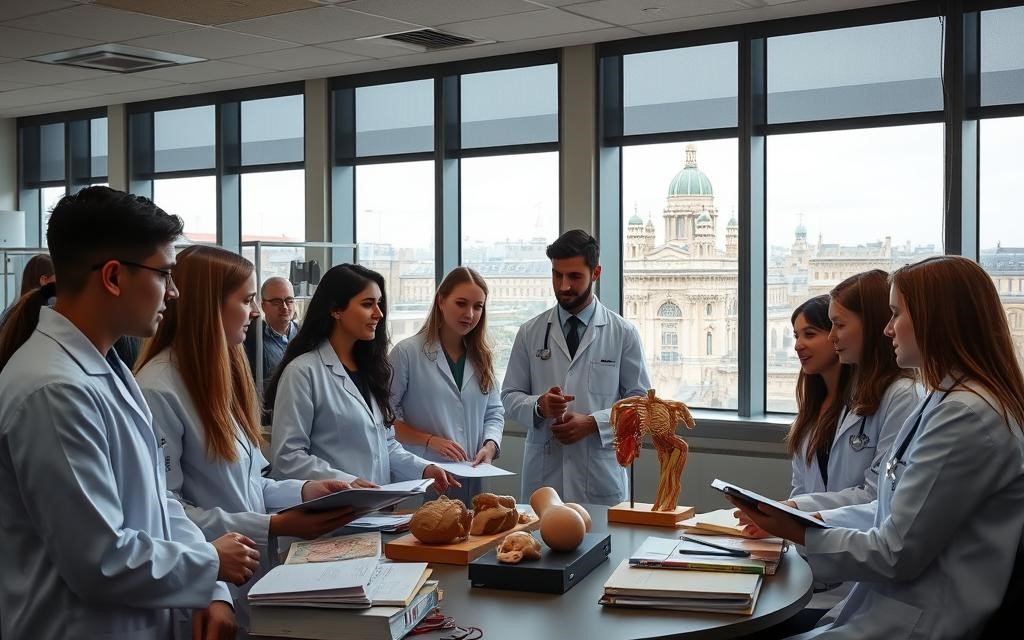I have always been drawn to the world of medicine, not just as a job but as a calling. It demands dedication, empathy, and a commitment to learning. Pursuing PG Medical Courses in UK is a significant step for me. It’s a chance to grow as a medical professional in a renowned educational setting.

A serene university campus in the UK during autumn, showcasing modern medical buildings with large glass windows, surrounded by colorful trees shedding leaves, students in lab coats discussing in groups, anatomical models and medical books scattered on benches, a peaceful atmosphere emphasizing academic pursuit in postgraduate medical education.
Key Takeaways
- The UK offers a variety of PG medical courses tailored for specialized training.
- Postgraduate education in the UK is recognized for its quality and excellence.
- There are multiple paths, including master’s programs and diplomas.
- Academic and language proficiency requirements shape the eligibility criteria.
- The chance to study at top universities enhances research opportunities.
Table of Content
Overview of PG Medical Courses in the UK
Advanced education is key in healthcare. The overview of pg medical education highlights paths for medical experts to grow. PG medical courses in UK help deepen clinical skills, going beyond what’s learned in undergrad.
Understanding Postgraduate Medical Education
Postgraduate medical education is vital for specialization. These programs last from one to several years, depending on the field. They welcome both new graduates and experienced professionals looking to expand their skills.
The focus is on both practical experience and theory. This ensures graduates are ready for today’s medical challenges.
Read Also- How to Get Admission to Top MBA Colleges in USA
The Importance of Specialized Training
Specialized training is crucial for complex medical areas like surgery or pediatrics. Getting advanced qualifications through PG medical courses in UK boosts job chances. It keeps professionals up-to-date and able to provide top-notch care.

A diverse group of medical students in white coats, studying together in a modern university classroom filled with anatomical models and medical textbooks, with large windows showing a view of a historic UK cityscape outside, highlighting elements of both tradition and innovation in medical education.
Types of PG Medical Courses in the UK
The UK offers a wide range of postgraduate medical education. This includes master’s programs for deep knowledge and diplomas for specific skills. These options are perfect for those looking to grow in their healthcare careers.
Master’s Programs in Medicine
Master’s programs in medicine are key for advanced training. You can earn degrees like Master of Science (MSc) and Master of Philosophy (MPhil). These cover important topics like clinical research and public health.
Top universities like the University of Oxford and Imperial College London offer these programs. They have tough courses and chances for research. Getting a master’s degree can boost your career in areas like academic medicine and healthcare policy.
Diplomas and Certifications
Medical diplomas and certifications are crucial for many. They focus on specific areas of medicine and take less time than a master’s. They’re great for doctors wanting to specialize or improve their skills without long studies.
For example, the Diploma in Tropical Medicine or the UK Diploma in Sports Medicine are great for certain fields. These qualifications help you grow professionally and can lead to more job opportunities.
Entry Requirements for PG Medical Courses in UK
Understanding the entry requirements for pg medical courses is key for those interested. These needs can change based on the program, school, and the applicant’s past. I’ll cover the academic and language skills needed for international students.
Academic Qualifications Needed
Candidates for postgraduate medical programs need strong academic backgrounds. They usually require a degree in medicine or a related field, like biomedical sciences. Some programs also ask for good scores on tests like the UKCAT or BMAT. These tests check if applicants are ready for medical school.
Language Proficiency Requirements
Applicants from non-English speaking countries must show they can speak English well. They need to pass tests like IELTS or TOEFL. Schools set a minimum score to make sure students can communicate well in a medical setting.
Top Universities for PG Medical Courses in the UK
In the UK, several top universities are known for their excellent PG medical courses. They are ranked high in medicine and offer great opportunities for research and hands-on experience. These places help future doctors get a strong education and learn by doing, which is key for their skills.
University Rankings and Programs
The University of Oxford and the University of Cambridge are at the top globally for medicine. They have many postgraduate programs in different medical areas. These programs are designed to keep up with the changing healthcare world.
University College London is also well-known for its innovative courses and research. Edinburgh University and King’s College London are other top choices. Each offers unique programs that mix academic learning with practical clinical experiences, readying students for medical careers.
Research Opportunities and Clinical Exposure
Postgraduate medical education is also about research. Oxford and Cambridge are big on research, letting students join in on important studies. This not only deepens their learning but also helps advance medical science.
Places like University College London and King’s College London also focus on real-world clinical experience. They work with local hospitals and healthcare groups. This mix of research and practice is crucial for students aiming to do well in medicine.
Study Modes for PG Medical Courses in UK
It’s important to know the different study modes for PG medical courses in UK. Each one has its own benefits, fitting various lifestyles and work commitments. I’ll look at full-time and part-time education, and the growing online learning options.
Full-Time vs. Part-Time Studies
Deciding between full-time and part-time medical education changes your learning experience. Full-time programs offer a deep dive into learning, with set schedules for classes and interactions. This way, you can finish your studies faster and start working sooner.
On the other hand, part-time studies give you flexibility. They let you keep working while studying. This is great for healthcare professionals who want to improve their skills without quitting their jobs. It also means you can apply what you learn right away, improving both your studies and career.
Online Learning Options
Online learning for medical courses has changed how we study. Many schools now offer online programs that let you learn at your own speed. This is perfect for those with busy lives. These programs use the latest technology for remote learning and keep students and teachers connected.
Online medical courses also focus on practical skills, even though you’re not in a classroom. This prepares you for the challenges of modern medicine. It also meets the needs of different learners, making education more accessible.
Career Prospects After PG Medical Courses in UK
After finishing postgraduate education in medicine in the UK, I have many career paths to explore. I can become a specialized consultant, a researcher, or an educator. Each choice can shape my career and help me contribute to the medical field.
The job market for healthcare workers is always changing. There’s a growing need for specialized skills and knowledge. This means there are lots of roles available in clinics, schools, research centers, and healthcare management. My advanced qualifications make me a top choice for jobs needing high expertise.
Specialized training keeps me up-to-date with the latest in medicine. This makes my job more rewarding and opens up more career opportunities. Investing in postgraduate education is key to reaching my professional goals.
FAQ For PG Medical Courses in UK
In the UK, you can find Master’s programs like MSc and MPhil in many medical fields. There are also diplomas and certifications for specific areas. These courses aim to boost the skills and knowledge of healthcare workers.
To start PG medical courses, you need a degree in medicine or a related field. Some programs ask for UKCAT or BMAT scores. You also need to show English language skills with IELTS or TOEFL.
PG medical courses vary in length. Master’s programs take one to two years. Diploma and certification courses can be finished in months to a year, depending on the program.
After finishing a PG medical course, you can become a consultant, researcher, or educator. The advanced qualifications you get improve your job prospects. They also open doors to career growth in specialized medical areas.




